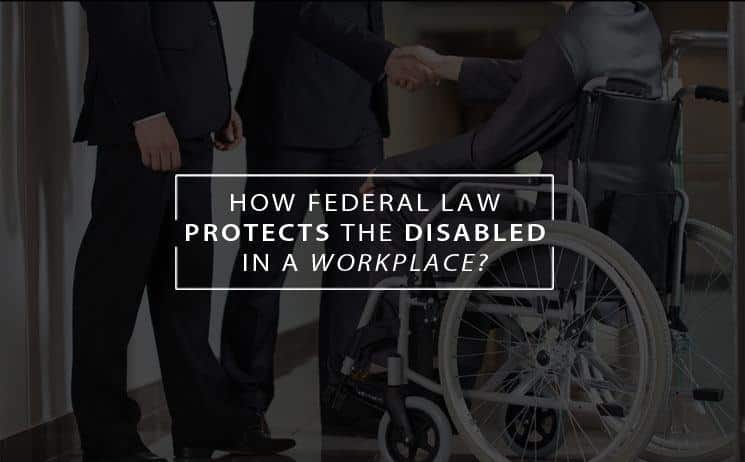HOW DOES FEDERAL LAW PROTECT THE DISABLED IN THE WORKPLACE?
This statement has often proven true in our daily lives and it is especially true for the disabled in the workforce. Many people have heard of the Americans with Disabilities Act of 1990 (ADA). The ADA is a federal act designed, in part, to ensure that those with disabilities are not discriminated against in the workplace. The ADA has an expansive reach and applies to public entities, public accommodations, etc., but the focus of this article is about how the ADA applies to employment. The ADA has been largely successful in eliminating much discrimination by employers, although it still occurs. Whether you feel you have been discriminated against based on a disability or simply want to learn more about the ADA, there are several questions to ask to understand if there has been an ADA violation.
DOES THE ADA APPLY TO ALL EMPLOYERS?
The first question to ask is whether or not the employer is an entity subject to the ADA. Not all employers fall under the ADA. The ADA applies to private employers that have 15 or more employees for each working day in each of 20 or more calendar weeks in the current or preceding calendar year. The ADA also applies to state and local governments. There are certain entities that do not fall under the ADA. For example, these include, the United States government, Indian tribes, some private membership clubs, and employers with less than 15 employees for each working day in each of 20 or more calendar weeks in the current or preceding calendar year. If the ADA does apply to your employer then you can move on to the next question.

IS THERE A DISABILITY?
The next question you should ask yourself is, do I have a disability? The ADA is specific in its definition of a disability and although you may feel you are disabled, the ADA will not apply unless your condition qualifies as a disability under the Act. ADA §3(2)(A-C) defines a disability as three-fold:
- A physical or mental impairment that substantially limits one or more of the major life activities of such individual,
- A record of such an impairment, or
- Being regarded as having such an impairment.
Some courts have debated over whether or not an individual truly has a disability and thus whether or not the ADA would even apply. The ADA’s definition of a disability is problematic to some as it is often unclear whether a condition “substantially limits a major life activity.” Major life activities include many things, such as reading, communicating, working, eating, seeing, walking, sitting, and the operation of major bodily functions (see adata.org/publication/ADA-faq-booklet for more details). Some obvious individuals that are covered are those who suffer from major mental diseases such as bipolar disorder or schizophrenia. Also covered are individuals with deafness or blindness.
Individuals who have a “record of such an impairment” are covered, as well as those who are “regarded as having such an impairment,” meaning that for example, the employer believes they have an impairment, even though they may not have it.
Determining whether an individual does or does not have a disability is a vital step in determining whether the ADA may apply to protect an individual against discrimination by their employment.
THE REASONABLE ACCOMODATION REQUIREMENT
If you have a disability under the ADA and the employer does qualify, then the next step is to ascertain whether or not your employer needs to provide a “reasonable accommodation.” A reasonable accommodation may be, for example, a handicap parking space so that the individual does not have to go far to get into the work building. A reasonable accommodation may be having to change the employee’s work schedule to accommodate the disability. A reasonable accommodation may mean providing or allowing certain equipment into the workplace to help that individual perform their job.
It is important to note that the ADA does not apply to those who even with a reasonable accommodation could not perform the essential functions of the job. Section 101(8) of the ADA elaborates and states that an individual who qualifies for ADA protection is a person with a disability who, “with or without reasonable accommodation, can perform the essential functions of the employment position that such individual holds or desires.” The ADA does not cover individuals who, even with a reasonable accommodation could not perform the essential functions of the job. The employer is only required to provide a “reasonable” accommodation. Any accommodations that are unreasonable, or accommodations that would impose an undue hardship on the employer, are not required under the ADA.
FOR EMPLOYERS:
For employers it is important to know that the ADA does not mean that every employer who qualifies under the act must make any accommodation to any disabled employee. Employers are only required to make “reasonable” accommodations to disabled employees.

In addition, it is important for employers to know that there are certain defenses available for discriminating against an individual with a disability. For example, one such defense is known as the direct threat defense. This was seen in a case where an individual with neurocardiogenic syncope worked for a trucking company as a driver (see EEOC v. Schneider Nat’l, Inc., 481 F.3d 507 (7th Cir. 2007)). Having neurocardiogenic syncope meant that the employee would have fainting spells. This was a danger to others, however, as drivers of semi-trucks could kill or severely injure others due to this condition if they were driving when they passed out. This was an instance where the direct defense was successful and the employer was not required to keep this individual on as a driver given his condition because it posed a direct threat to others.
The employer also does not have to provide a reasonable accommodation for the disabled if it would pose an undue hardship. Whether or not an accommodation would pose an undue hardship is often a complicated issue and determination. There are also other defenses that an employer has which are not discussed in this article.
FOR EMPLOYEES:
For employees, the ADA brings comfort in knowing that employers are not to discriminate against employees based on their disability. The general rule is that no covered employers are to discriminate against an individual based on a disability in relation to “job application procedures, hiring, advancement, discharge of employees, employee compensation, job training, and other terms, conditions, and privileges of employment” (see ADA §102(a)). The broad language of the ADA indicates that, overall, disabled employees have protection against discrimination in nearly every area of employment, including the hiring or termination of employees. Thus individuals, for example, that have been fired due to a disability may be protected under the ADA.
SUMMARY:
The Americans with Disabilities Act of 1990 was a federal law aimed at eliminating invidious discrimination against the disabled in employment and other areas. The ADA is a complicated act and this article is no substitution for the valuable advice a competent attorney can give. The attorneys at Denton Peterson, PC can evaluate your specific situation and can explain options that are available to you if you feel that the ADA applies to you. Call us today!

Brad Denton – Denton Peterson, PC
1930 N Arboleda #200
Mesa, AZ 85213
Office: 480-325-9900
Email: [email protected]
Website: dentonpeterson.com